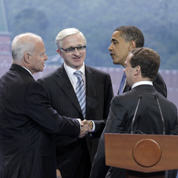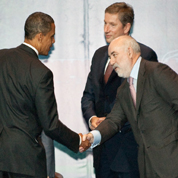Russia-U.S. business summit gets a boost from Medvedev-Obama presence

The participation of Dmitry Medvedev and Barack Obama at a high-profile meeting of top business executives from both Russia and the United States that was sandwiched between their first official summit in Moscow in July offered a huge and unprecedented boost to the business titans’ commitments to reinforcing the existing business-to-business ties between the two countries’ economies.
The various discussion panels on key economic issues at the Russia-U.S. Business Summit, co-organized by the business communities in both countries, offered realistically feasible ways of boosting the embarrassingly low level of economic interactions between Russia and the United States. Indeed, judging by the event’s agenda and the attendees roaster, it now seems that the political and business elites on both sides have now come to realize that they stand to gain more from each other if their constantly rocky political relationships that have traditionally hamstrung more productive bilateral economic cooperation for decades are finally regulated in ways that will increase mutual trust between the two ex-Cold War enemies that are still much suspicious of each other’s intents on all unresolved issues.
Thus, speaking before the colorful audience, Obama strongly decried the low figures of U.S. businesses’ operations in Russia, which pale significantly compared with analogous data from other global economic powerhouses. “Currently, the trade volume between our countries is just $36bln, which is about 1% of U.S. gross trade with the rest of the world, a percentage that has remained virtually unchanged since the end of the Cold War,” he said, noting that the current trade figure is on par with that of Thailand, a country with less than 50% of Russia’s population. Besides, with just about 3.4% of accumulated investments in Russia, the United States is on the eighth spot, far behind other top foreign sovereign investors.
Obama noted that these starkly poor economic data and the untapped advantages of positive synergies — waiting anxiously to be harnessed by both governments and businesses since the ill-managed collapse of the Soviet Union — underscored his goal of ‘resetting’ U.S. rocky relations with Russia. “Surely, we can do better. Our fortunes are linked, and yet so much potential remains untapped,” he added. To start with, Obama called for the simplification of the existing investment conditions for companies in both countries. On his part, Medvedev urged U.S. investors to look beyond Russia’s traditionally lucrative oil and gas sectors to other key spheres, including those customary for the Russian economy and also the relatively new, high-tech-based industries such as the production of ecologically clean products and ‘green economy’ in general. “I believe we have good opportunities for mutually beneficial cooperation in these and other areas.”
One of the conditions for establishing better trade relations, according to Obama, will be Russia’s commitment to the rule of law. “We have to promote transparency, accountability and the rule of law, on which investments and economic growth depend. Therefore, I very much welcome Medvedev’s initiatives to promote the rule of law and ensure a mature and effective legal system as a condition for sustained economic growth.” Also, Obama has expressed the United States’ readiness to drop the now largely redundant Jackson-Vanik amendment, adopted in 1975 against the Soviet Union’s deplorable emigration policy against the Jews.

The U.S. unwillingness to void this amendment, 20 years after the demise of the Soviet empire, and after contemporary democratic, post-Soviet Russia has established a visa-free regime with Israel, one of the key default destinations for the Soviet Jews at the time of the adoption of the amendment, has led many to view the vestigial policy as a new economic tool of exacting unnecessary political pressure on Moscow to make key concessions on strategic issues. Commenting on the issue, Russian Foreign Minister Sergei Lavrov said Obama has now fully understood ‘all the awkwardness’ of the continuous existence of the amendment, and has consequently assured Moscow that dropping the vestigial policy is one of his administration’s top priorities.
U.S. companies ready to boost investments in Russia
Russian and U.S. presidents’ declared commitment to smoothening the thorny issues in their relationships has provided the business executives with the previously lacking ‘long-term politically conducive atmosphere’ they need to focus more on core issues of boosting mutual trade and investments that are expected from the positive economic synergies of the newly ‘reset’ bilateral political relations. Thus, stressing the importance of cordial political landscape for deepening mutual economic ties between countries, Andrew Somers, the president of the American Chamber of Commerce in Russia, noted that significant progress on key geopolitical issues will certainly translate into more investments by U.S. companies into Russia. Somers seems to have ‘hit the nail right on the head,’ because while the overall result of the first Medvedev-Obama summit is still being analyzed by experts, the U.S. business establishment has already passed its unequivocally positive verdict.
This is evident in plan by John Deere, a U.S. agricultural machinery maker, to invest $500mln in Russia, PepsiCo’s decision to increase its investment from $3bln to $4bln and Boeing Corp.’s pumping $65mln into a joint venture with VSMPO-Avisma, the world’s largest titanium producer. This is addition to the plane maker’s $5bln already invested in Russia from 2003-09 and its long-term plans of raising its overall investment over the next 30 years to $27bln. These are just only a few of new plans announced/signed in July alone, and therefore, represent significant additions to several other multibillion projects either under realization or in different stages of finalization among companies in both countries. For instance, Microsoft Corp. CEO Steve Ballmer said in April that he would invest $300mln into Russia over the next three years.
Such high volume of U.S. companies’ investments is an indication of their long-term commitment to Russia, despite the current global economic downturn, the well-known ‘legal nihilism,’ inflexible bureaucracy and immeasurable corruption in the country. Experts believe that positive resolutions of these negative factors will prompt an exponential boost in mutual trade and investments into each other’s economies. “I think the concern about the rule of law is the single biggest inhibitor to investments by U.S. companies in Russia. This is a big competitive disadvantage for Russia, and will continue to remain so, until they straighten it out it.”
Business summiteers’ reactions
However, going by the roaster of U.S. business executives at the forum, one can conclude that key strategic investors with a long-term business vision for Russia have neither exited nor downgraded their operations in the country, despite the negative trends in the domestic economy that is currently experiencing one of its roughest periods.
Indeed, all the summiteers believed that such high-profile meetings between the two countries’ political leaderships and business communities are capable of changing the decades-long ‘shamelessly low’ business activities between the two nations. However, for this to happen, the CEOs, who, as heads/owners of businesses, feel ‘the rawness of these problems on their skins on a daily basis, have lined up several ways for improving the bilateral relationships. For instance, U.S. law firm Baker & Mckenzie Chairman John Conroy highlighted the importance of continuous dialogs aimed at resolving issues that currently constrain relations between the two countries. “There are hurdles in the Russian-U.S. business relations.

But what is good is that we have this type of dialog, that both governments and businesses are working together to make sure that hurdles, whether they are massive or challenging, are addressed.” Similarly, Viktor Vekselberg, the owner of the Renova Group, called on both countries to sign an agreement on protection of mutual investments as a way to remedy the ‘appallingly low level’ of business cooperation. “We should be ashamed of the size of our mutual investments and take the strong positive signal from Obama as a call on all companies to reexamine the business possibilities in our countries.”
Speaking on the influence of geopolitics on the bilateral business ties, Russian Railways President Vladimir Yakunin says unresolved geopolitical issues between countries will always hold businesses hostage. “This is because geopolitics will always be a factor in international affairs and will, therefore, always affect businesses.” Agreeing with this view, Alexander Shokhin, the president of the Russian Union of Entrepreneurs and Industrialists, cited as an example the last year’s exodus of U.S. companies from Russia after the Georgian war. “The companies exited Russia not because of a political direct order from the White House, but due to a perception of an imminent worsening of relationships between Moscow and the West over the issue.”
And, summarizing the current political and economic ties with United States, Basic Element owner Oleg Deripaska said the results of the Medvedev-Obama summit should be measured not so much by the number of strategic agreements signed, but by the change in atmosphere that holds keys to the solutions of several thorny issues in the two countries’ bilateral relations. “This is why we must distinguish between true national interests and past decisions that are bye-products of bureaucracy, special interests and outdated mentality.”
Going by the business summiteers’ overall positive reactions, one can say that the event has achieved its goal of offering the political and business elites of both countries a clearer agenda on ways to move their political and business cooperation significantly forward on a broad range of issues of both bi- and multilateral importance as well as global relevance.












 Web design,
Web design,